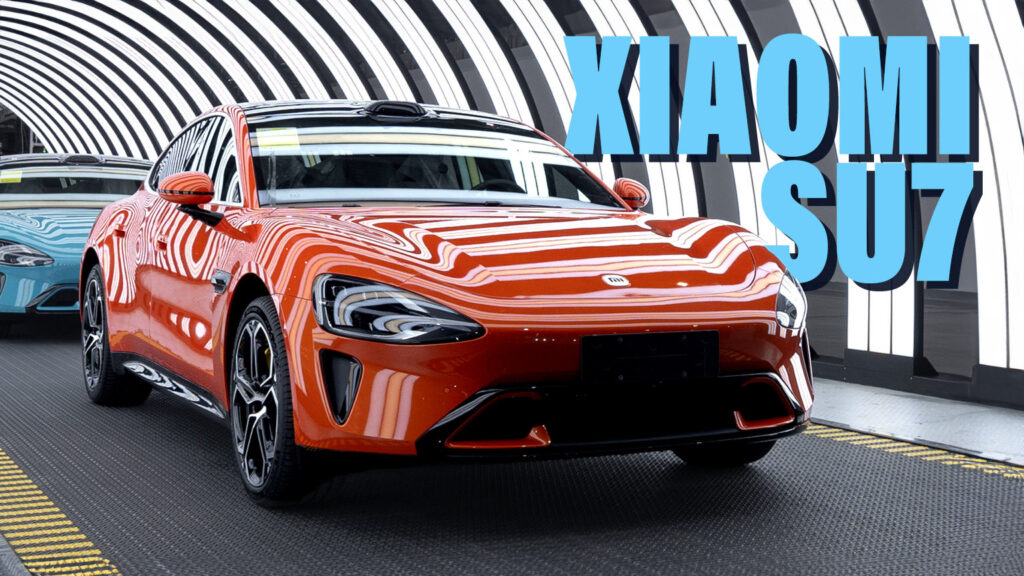China’s EV wars are heating up as the Xiaomi SU7 costs less than expected and less than is needed to make a profit, with the company’s CEO admitting they are selling them at a loss.

- The smartphone giant’s first car, the SU7, boasts impressive specs, even when compared to the Tesla Model S and Porsche Taycan.
- The company aims to gain market share by selling the SU7 at a loss initially, with prices ranging from $29,900 for the 295 hp RWD model, rising to $41,500 for the AWD 663 hp Max version.
- Xiaomi’s new car raked in a staggering 50,000 firm orders within the first 27 minutes of launch, with demand doubling in just 3 minutes.
Chinese smartphone manufacturer Xiaomi has come out swinging with its first-ever electric vehicle. Featuring Chris Bangle-approved design, Porsche-like performance, and impressive range, the mid-size sedan will hit the market with an impressively low starting price of just 215,900 yuan (approximately US$29,900 at current exchange rates).
It it presents a compelling option for consumers, coming in at more than 30,000 yuan (around US$4,000) less than the Tesla Model 3. What’s more impressive is that despite this lower price tag, the SU7 boasts a minimum driving range of 435 miles (700 km), surpassing the Tesla’s 377 miles (606 km) in China. Xiaomi CEO Lei Jun proudly announced that their sedan outperformed the Model 3 in 90 percent of benchmark tests.
3 Different Versions
Measuring 4997mm (196.7 inches) long, 1963mm (77.3 inches) wide, and 1455mm (57.3 inches) tall with a 3,000mm (118.1 inches) wheelbase, the SU7 will launch in three variants.
The entry-level model, priced at $29,900, is the Standard RWD version. It features a 400V architecture, a 73.6 kWh battery, and is driven by a 295 hp (220 kW) and 400 Nm (295 lb-ft) electric motor. Itl offers a CLTC driving range of 700 km (435 miles) and can charge up to 350 km (218 miles) in just 15 minutes.
Next in line is the SU7 Pro, similarly outfitted with a 400V architecture but boasting a larger 94.3 kWh battery. It maintains the same 295 hp RWD motor found in the Standard model. With an driving range of 830 km (516 miles) on the CLTC cycle, it begins at 245,900 yuan ($34,000).
Read: Xiaomi SU7 Will Outrun A Porsche Taycan And Outlast A Tesla Model S
Finally, topping the range is the SU7 Max, featuring an 800V architecture and a 101 kWh battery paired with dual electric motors generating 663 hp (495 kW) and 838 Nm (618 lb-ft) of torque. This performance-oriented model can accelerate from 0-100 km/h (62 mph) in just 2.78 seconds, reaching a top speed of 265 km/h (165 mph). It offers a maximum driving range of 800 km (497 miles) on the CLTC cycle and starts at 299,900 yuan ($41,500).
Sold At A Loss
How can it offer all that at such low prices? Well, Xiaomi’s Lei admitted that each vehicle will be sold at a loss, per CNBC. Just how much of a loss is not clear, but the gambit has succeeded in attracting the attention of buyers. The company claims it received 50,000 orders within 27 minutes of opening sales.
While those orders come at a cost—literally—that’s an impressive feat. Xiaomi has entered a competitive EV market in China. Despite that, the CEOs of many of the brand’s upcoming competitors were in attendance at the SU7’s launch. SCMP reports that Lei credits the heads of companies like Xpeng, Nio, and Li Auto with helping Xiaomi avoid a number of potential pitfalls on its way to launching its first vehicle.
Part of Xiaomi’s “Human x Car x Home” strategy, which seeks to build an ecosystem of devices connected to its HyperOS operating system, the SU7 will be compatible with its phones. However, it won’t only be compatible with its devices. The electric sedan will be able to run Apple CarPlay, and the iPad can be integrated into it.
Xiaomi also revealed a number of accessories for the SU7 at its launch. In addition to smartphone holders, consumers will also be offered custom sun shades for the front window, and an in-car refrigerator. Some accessories will be included in the purchase price of the vehicle.
The Chinese automaker said that its driver-assist technology will be available on highway and in cities in China as of August. Tesla’s Autopilot is only available on highways in China, and FSD has not yet been released there.
Deliveries of the Xiaomi SU7 are set to begin in April, and it will be built at a factory where all “key steps” of production are fully automated. The company claims that this will enable it to produce a car every 76 seconds.


